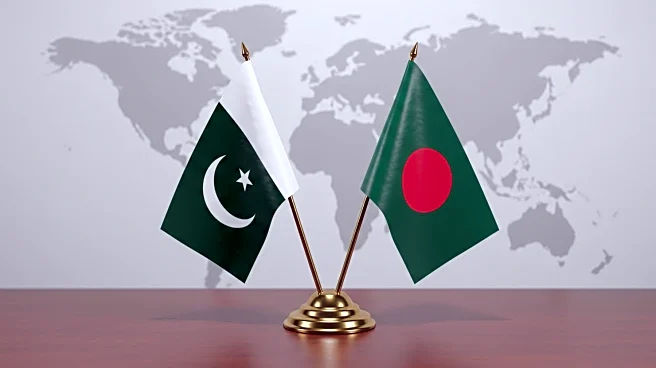What's Happening?
Pakistani Foreign Minister Ishaq Dar has embarked on a historic visit to Bangladesh, marking the highest-level Pakistani official visit to Dhaka since 2012. The visit aims to reset relations between the two nations, which have been improving since the ousting of Bangladesh's former Prime Minister Sheikh Hasina. During his visit, Dar held discussions with key Bangladeshi officials, including Foreign Affairs Adviser Touhid Hossain, focusing on enhancing economic and commercial cooperation. The two countries are expected to sign several agreements, particularly in trade, and have already begun sea trade, expanding government-to-government commerce. Plans are also underway to initiate direct flights between Dhaka and Karachi. Dar's visit underscores Pakistan's desire to forge a cooperative relationship with Bangladesh, as he met with various political delegates, including those from the Jamaat-e-Islami party and the Bangladesh Nationalist Party.
Why It's Important?
The visit signifies a potential shift in regional dynamics, as Bangladesh's relations with India have been strained following political upheavals. Strengthening ties between Pakistan and Bangladesh could lead to increased economic collaboration and connectivity in South Asia, potentially impacting regional trade and political alliances. The easing of visa restrictions and the initiation of direct flights could facilitate greater movement of people and goods, enhancing bilateral trade. This development may also influence the South Asian Association for Regional Cooperation (SAARC), as both countries seek to make the regional alliance more active and robust. The visit could also affect Bangladesh's internal politics, as it navigates its relationship with India and addresses demands for the return of former Prime Minister Hasina.
What's Next?
Following the visit, Pakistan and Bangladesh are expected to formalize agreements that could lead to increased trade and investment. The establishment of joint commissions to boost economic collaboration is anticipated, along with the approval of direct flights between the two countries. Political leaders and military commanders from both nations have already engaged in discussions, indicating a comprehensive approach to strengthening ties. The regional implications of this visit may prompt reactions from neighboring countries, particularly India, as Bangladesh continues to demand the return of Hasina. The evolving relationship between Pakistan and Bangladesh could influence future diplomatic and economic strategies in South Asia.
Beyond the Headlines
The visit highlights the complex historical relationship between Pakistan and Bangladesh, stemming from the 1971 war and the subsequent formation of Bangladesh. While the visit aims to foster cooperation, underlying tensions remain, as Bangladesh continues to demand an apology from Pakistan for past atrocities. The political dynamics within Bangladesh, including the role of the newly formed National Citizen Party, could shape the country's future alliances and policies. The visit also reflects broader geopolitical shifts in South Asia, as countries reassess their alliances and economic partnerships in response to changing political landscapes.










